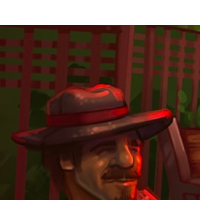Capitulo 1 - La Biblioteca
Глава||библиотека
Chapter||Library
Kapitel 1 - Die Bibliothek
Κεφάλαιο 1 - Η βιβλιοθήκη
Episode 1 - The Library
第1章 - 図書館
Capítulo 1 - A biblioteca
第一章 - 圖書館
La biblioteca
|Библиотека
Library
도서관
–¡Es una buena idea!
|||мысль
|||idea
-It is a good idea!
- 좋은 생각이야!
–dijo Marta.
|Марта
said|Marta
Said Marta.
Marta es científica.
||учёная
||Wissenschaftlerin
Marta||scientist
Marta ist Wissenschaftlerin.
Marta is a scientist.
Marta는 과학자입니다.
Habla con sus compañeros Tony y David.
||||Тони||
||his|friends|Tony||David
Talk to your classmates Tony and David.
Parlez à ses camarades de classe Tony et David.
반 친구들 Tony와 David에게 이야기하십시오.
Tony es arqueólogo y David es lingüista.
||археолог||||лингвист
||||||Linguiste
||archaeologist||||linguist
Tony is an archaeologist and David is a linguist.
토니는 고고학자이며 데이비드는 언어 학자입니다.
Tony estudia el pasado y David estudia los idiomas.
|учит||прошлое|||||
|studies||past|||studies||
Tony studies the past and David studies languages.
Tony는 과거를 연구하고 David는 언어를 공부합니다.
Todos están reunidos en la biblioteca, hablando de España.
||собрались||||говоря||
||together||||talking||Spain
Everyone is gathered in the library, talking about Spain.
모두가 스페인에 대해 이야기하면서 도서관에 모여 있습니다.
Все они собрались в библиотеке, обсуждая Испанию.
–¡Sí!
-Yes!
¡Claro que es una buena idea!
конечно|что||||
Of course|||||
Sicher ist eine gute Idee!
Of course it's a good idea!
Bien sûr, c'est une bonne idée!
물론 그것은 좋은 생각입니다!
Конечно, это хорошая идея!
–dice David.
says|
Says David.
Dit David.
데이빗이 말한다.
–No lo sé –responde Tony.
|||answers|
"I do not know," Tony replies.
"나는 모른다."토니가 대답했다.
Я не знаю, - отвечает Тони.
–¿Qué no sabes, Tony?
||знаешь|
What||you know|
- What do not you know, Tony?
- 너 몰라, 토니?
-Чего ты не знаешь, Тони?
–dijo Marta otra vez.
|||раза
||again|
Marta said again.
마르타가 또 말했다.
-сказала Марта.
–España es muy grande y tiene mucha cultura.
|||||||культура
|||big||||culture
-Spain is very big and has a lot of culture.
- 스페인은 매우 크고 많은 문화를 가지고 있습니다.
Las regiones son muy amplias y tienen mucha historia.
|регионы|||широкие||||
|regions|||spacious||||
The regions are very broad and have a lot of history.
이 지역은 매우 광범위하며 많은 역사가 있습니다.
Эти регионы очень большие и имеют богатую историю.
–¿Y qué problema hay?
||проблема|
||problem|is
-And what's the problem?
"Et quel est le problème?"
-В чем проблема?
–Necesitamos mucho dinero.
нужно||
We need||
-We need a lot of money.
-Нам нужно много денег.
Ese es el problema.
тот|||
That|||
That's the problem.
Los tres amigos hablan en una mesa de la biblioteca.
||||||стол|||
|||speak|||table|||
The three friends speak at a table in the library.
Marta, la científica y David el lingüista, no entienden por qué Tony dice eso.
||||||||понимают|||||
||scientist||||||understand|||||
Marta, the scientist and David the linguist, do not understand why Tony says that.
과학자이자 언어학자인 David Marta는 Tony가 왜 그런 말을하는지 이해하지 못합니다.
Марта, ученый, и Дэвид, лингвист, не понимают, почему Тони так говорит.
–¡Eso no es ningún problema!
|||no|
-That's no problem!
Tenemos mucho dinero ahorrado –dice David.
|||сэкономлено||
We have|||saved|says|
We have a lot of money saved, says David.
Nous avons beaucoup d'argent économisé », dit David.
데이빗은 많은 돈을 저축했습니다.
Ahora mismo están en una biblioteca de Swansea, en Gales, Reino Unido.
|||||||Суонси||Уэльс|королевство|Соединенное Королевство
|||||||Swansea||Wales|King|United
Right now they are in a library in Swansea, in Wales, United Kingdom.
현재 그들은 영국 웨일즈의 스완 지 (Swansea)에있는 도서관에 있습니다.
В настоящее время они находятся в библиотеке в Суонси, Уэльс, Великобритания.
Los tres amigos hablan de España.
The three friends talk about Spain.
Quieren viajar allí y conocer la cultura de España, la gente española y el idioma español.
Хотят|путешествовать|||узнать|||||||испанская|||язык|испанский
They want|to travel|there|||||||||Spanish|||language|Spanish
They want to travel there and get to know the culture of Spain, the Spanish people and the Spanish language.
그들은 거기를 여행하여 스페인 문화, 스페인 민족 및 스페인어를 알기를 원합니다.
–Entonces sí podemos ir a España.
||we can|||
-Then we can go to Spain.
- 그럼 우린 스페인에 갈 수있어.
-Тогда мы сможем поехать в Испанию.
El viaje en avión es muy barato hoy en día.
|trip|||||cheap|today||day
Air travel is very cheap nowadays.
오늘날 항공 여행은 매우 저렴합니다.
Воздушные перевозки в наши дни очень дешевы.
No es caro viajar a España –dice Marta
||дорого|||||
||expensive|||||
It's not expensive to travel to Spain, says Marta
–Yo quiero ir y visitar universidades.
||||посетить|университеты
||||to visit|universities
-I want to go and visit universities.
Quiero ver las carreras de ciencias que estudian allí.
|||карьеры||наук|||
|||majors||sciences|||
Ich möchte die naturwissenschaftlichen Kurse sehen, die sie dort belegen.
I want to see the science careers that study there.
Je veux voir les majors scientifiques qui y étudient.
거기에서 공부하는 과학 경력을보고 싶습니다.
Я хочу увидеть научную карьеру, которая там учится.
–Yo quiero visitar diferentes sitios de España y conocer su cultura y su pasado –dice Tony, el arqueólogo.
|||разные|места|||||||||||||
|||different|sites||Spain||to know||culture|||||||
-I want to visit different places in Spain and know their culture and their past, says Tony, the archaeologist.
- 스페인의 다른 장소를 방문하고 그들의 문화와 과거를 알고 싶습니다. 고고학자 Tony는 말합니다.
–Está bien... –dice al final David, el lingüista
||||в конце|||
||||final|||
-Okay ... -said David, the linguist at the end
- 알았어 ... - 데이빗, 언어학 자라.
–Entonces vamos a España.
|let's go||
-Then let's go to Spain.
Es una buena idea aprender español nativo.
||||||родной
||||to learn||native
Es ist eine gute Idee, Spanisch zu lernen.
It is a good idea to learn native Spanish.
원어민 스페인어를 배우는 것이 좋습니다.
David lleva varios libros de la biblioteca.
||несколько|книги|||
||||||Bibliothek
David|carries|several|books|||
David carries several books from the library.
David porte plusieurs livres de la bibliothèque.
David는 도서관에서 여러 권의 책을 소장하고 있습니다.
Дэвид несет несколько книг из библиотеки.
Los libros son en español y hablan de España y su cultura.
The books are in Spanish and speak of Spain and its culture.
Les livres sont en espagnol et parlent de l'Espagne et de sa culture.
–¡Estos libros son de gran ayuda!
эти|||||помощь
|||||Hilfe
These||||great|help
- These books are very helpful!
-Эти книги очень помогают!
¡Vamos!
Let's go
Let's go!
Allons-y!
Давай!

